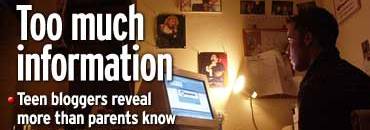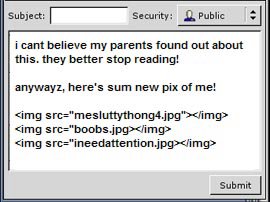I'm not old...only 32, and I don't "think" old...but I just don't understand the new generation of putting your personal private thoughts and information out there for everyone to see. Especially with all the sex offenders and predators out there. You don't know who you are dealing with out there in cyberworld. You would think these kids would know this??? What ever happened to a good old-fashioned DIARY???

Schools Alarmed Over Teens' Bold Blogs
By Tara Bahrampour, Lori Aratani, and The Washington Post
No one under 18 would be surprised to hear that teenagers like to post their intimate thoughts and photographs online — they've done it for years. But school administrators have begun to take notice, and some are warning students that their online activities may affect not only their safety, but also their academic and professional lives.
In recent weeks, several Washington-area schools have taken action against the use of blog sites, in particular Facebook.com but also the sites MySpace.com and Xanga.com, which allow teenagers — and sometimes younger children — to post details of their lives for all to see.
Meredyth Cole, assistant head of school at the private Madeira school in McLean, Va., said officials there were “shocked and amazed” to see how many students use Facebook, a widely used networking site which began for college students in 2004 and was expanded late last year to include high school students. Besides the most obvious danger — adult stalkers enticing teenagers into face-to-face meetings — Cole warned that personal information posted online can also be read by college admissions officers and future employers. “We are trying to figure out how do our school rules relate to this type of behavior,” Cole said.
Some colleges have expelled teenagers for violating codes of conduct after discovering photos of underage students posing in front of kegs or writing about drinking binges, and employers often look up job candidates on the sites, said Internet lawyer Parry Aftab, executive director of Wiredsafety.org.
Personal information can also be used for commercial purposes. One local private school last month warned students and parents that Facebook can sell information about students to marketers and can use and display their contributions, including photos. These days, teenagers' lockable journals and triple-underlined threats of “PRIVATE, KEEP OUT!” have given way to instant messaging, reality shows and a cyberculture that many adults find naive at best and exhibitionist and dangerous at worst.
Steve Jones, a communications professor at the University of Illinois at Chicago, said that the sites pose new quandaries for educators, including cyberabuse. He cited a recent case in which three middle-school students in the Chicago area were suspended after pos
 ting obscene and threatening remarks about a teacher on a Web log. The school community was split over the action. “It's an open question, because students have been writing these sorts of things for years but have been doing it in their notebooks, where nobody would have ever stumbled across it,” he said. “With blogs, it's a sign of things to come — we're sort of testing the notions regarding free speech.”
ting obscene and threatening remarks about a teacher on a Web log. The school community was split over the action. “It's an open question, because students have been writing these sorts of things for years but have been doing it in their notebooks, where nobody would have ever stumbled across it,” he said. “With blogs, it's a sign of things to come — we're sort of testing the notions regarding free speech.”Many schools forbid the use of school computers for anything not school-related, but it's much harder to regulate what students do on home computers. Schools are scrambling to come up with policies on the issue. A Catholic school in New Jersey banned use of the sites even at home, although experts question the legality of such bans. Use of Facebook is easier for schools to regulate because it requires users to sign in using a school-issued e-mail address. But anyone can start an account on such sites as MySpace, and it is easy to find teenagers' blogs through those sites even without starting an account. Xanga, for example, groups blogs by high school or middle school, making it easy to find one for any teenager who has signed in to his or her school's “blogring.”
Ironically, many teenagers are outraged or embarrassed when
 parents or other adults go to their sites. “I think they see it as a violation of their personal space,” said Madeira's Cole. “They feel as if their diaries are being read.” But adults do read the sites. The National Center for Missing and Exploited Children reported 1,224 incidents last year of “online enticement” of children by adults and estimates that one in five children gets sexual solicitations online. Yet to many teenagers, the sites are irresistible. Aftab said that even teenagers who work with her to warn others about the sites have their own sites. “Why in God's name would you have a Xanga site?” she asked one, and the answer was poignant. “I'm in seventh grade,” the girl said. “It's really hard to be in seventh grade these days. It's really hard if you're shy and you're not a cheerleader or extraordinarily popular. I travel, I take pictures, I write poetry. I'm a nice kid, and if I can write a profile that will make people notice me, why shouldn't I?”
parents or other adults go to their sites. “I think they see it as a violation of their personal space,” said Madeira's Cole. “They feel as if their diaries are being read.” But adults do read the sites. The National Center for Missing and Exploited Children reported 1,224 incidents last year of “online enticement” of children by adults and estimates that one in five children gets sexual solicitations online. Yet to many teenagers, the sites are irresistible. Aftab said that even teenagers who work with her to warn others about the sites have their own sites. “Why in God's name would you have a Xanga site?” she asked one, and the answer was poignant. “I'm in seventh grade,” the girl said. “It's really hard to be in seventh grade these days. It's really hard if you're shy and you're not a cheerleader or extraordinarily popular. I travel, I take pictures, I write poetry. I'm a nice kid, and if I can write a profile that will make people notice me, why shouldn't I?”To Aftab, “it's a very sad testimonial these days that a kid has to post something on a site where potentially 700 million people can see it in order to attract the attention of a kid two seats down.” Aftab acknowledges that the sites have their good points: Kids get to show off an expertise or be creative. “A kid with a boring life can go on to MySpace and become a punk rocker in two minutes.” But it can also be isolating. “They do less face-to-face talking, less phone talking, less playing outside than any other generation, and because of that, the Internet is real to them, but the risks aren't,” Aftab said. Neither are some of the worlds they create. Experts, and teenagers themselves, say that much of what is on the sites is made up.
Teenagers often act online in ways they wouldn't off-line — bullying each other,
 posing in underwear, using foul language or sporting guns and Ku Klux Klan hoods. Increasingly, many teenagers feel pressured to show themselves doing more risque things, even if they are not actually doing them. Aftab cited an example of girls who had blogged about weekends of drinking and debauchery, while in reality they were coloring with their younger siblings or watching old movies with Grandma. “Even if you weren't out drunk and partying on the weekend, you have to pretend you were,” Aftab said. “Maybe parents should be relieved.”
posing in underwear, using foul language or sporting guns and Ku Klux Klan hoods. Increasingly, many teenagers feel pressured to show themselves doing more risque things, even if they are not actually doing them. Aftab cited an example of girls who had blogged about weekends of drinking and debauchery, while in reality they were coloring with their younger siblings or watching old movies with Grandma. “Even if you weren't out drunk and partying on the weekend, you have to pretend you were,” Aftab said. “Maybe parents should be relieved.”
No comments:
Post a Comment